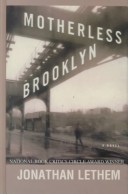Reviewed by gmcgregor on
The story centers on Lionel Essrog, one of four men who grew up in an orphanage taken under the wing of Frank Minna, a small-time gangster in (pre-gentrification) Brooklyn. Despite the criminal acts into which Frank draws him beginning when he's just a teenager, Lionel is deeply loyal to Frank, one of the only people who has ever shown compassion for and understanding of his severe case of Tourette's Syndrome. When Frank is murdered at the beginning of the book, Lionel puts all his sleuthing skills to work to find the killer: could it be Frank's mysterious wife, Julia? Could it be "the clients", the old Italians who dole out tasks to the team? Could it even be another member of the team looking to create a leadership vacancy? And how does the Zen Buddhist center where Frank was last seen alive tie into everything, if it does at all?
I'll start with the positive. Even with a relatively limited reference point for the cliches of noir, I could understand the way that Lethem was playing with them: the silent, repressed detective hero is completely turned on its head with Lionel's Tourette's making him fidgety and unable to keep quiet. The femme fetale, Frank's wife Julia, instead of tempting Lionel with her sensuality, reveals she's slept with every member of the team besides him and doesn't intend to change that. Lionel at one point gets bounced from a Buddhist meditation session by obvious criminals and no one lifts a finger to stop it because they're too absorbed in their practice. It's over the top and ridiculous in a way that's clever and meant to be funny.
But for me, all of that humor failed to land. I didn't get involved at all in the story because I didn't care for a second about any of the characters. I couldn't have cared less who killed Frank or even Lionel's journey, because Lethem didn't bother to write Lionel (or anyone else) as remotely compelling. The entire book felt like an exercise in intellectual masturbation, in which Lethem decided he wanted to engage in wordplay and wrote the Tourette's into the story to give him the opportunity to do so. After a while I found myself skimming virtually all of the dialogue because it got tiresome to read. And don't even get me started on the sex scene, one of the most cringeworthy ones I've ever read and that I dearly wish I could un-read so as to never think of again. Y'all, I hated this and I recommend avoiding it at all costs.
Reading updates
- Started reading
- 8 June, 2018: Finished reading
- 8 June, 2018: Reviewed
